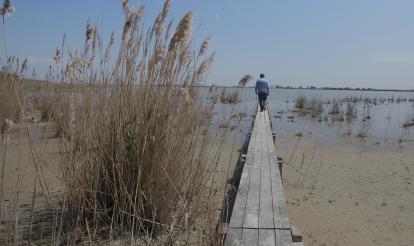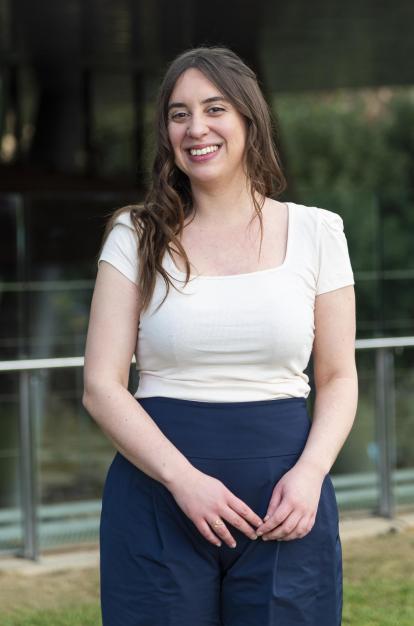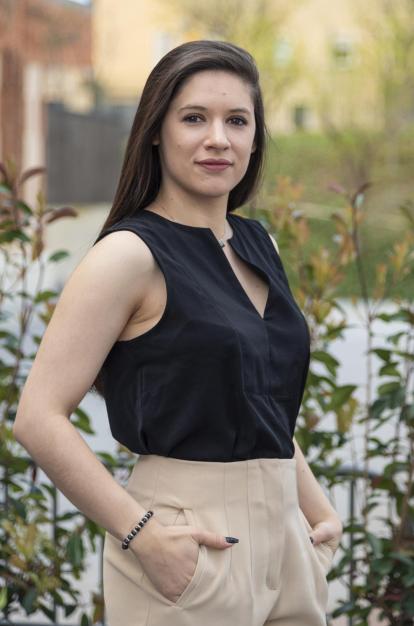
You are reading:

You are reading:

03.05.24
6 minutes readSend your questions to:
BSc in Environmental Sciences and predoctoral researcher at the Institute of Environmental Assessment and Water Research from the Spanish National Research Council (IDAEA-CSIC)
Request interviewBSc in Physics and predoctoral researcher at the Donostia International Physics Center (DIPC) and at the Material Physics Center (CFM)
Request interviewBSc in Ecology, PhD from the University of Edinburgh and postdoctoral researcher at the Centre for Ecological Research and Forestry Applications (CREAF)
Request interviewOn our blue planet, less than 1% of the Earth’s water is available for human use, a situation that is set to worsen with climate change, according to the UN. Clearly, the management, distribution and storage of this strategic resource are at the heart of the debate. Understanding nature’s processes, increasing underground reservoirs or obtaining water free of pollutants are the solutions that three doctoral and postdoctoral researchers are working on with the support of the ”la Caixa” Foundation. Their aim is to ensure that more and better-quality water is available for a more sustainable and resilient future, in view of predictions of more frequent and severe droughts.
When the drought emergency was declared in Catalonia, the Argentinean Luciana Scrinzi had been working for four months at the Institute of Environmental Assessment and Water Research, IDAEA-CSIC, conducting research on the aquifers and rivers in the region. The proximity of the crisis generated a sense of urgency and gave meaning to her work that she had never known before. “I had previously designed systems for different locations in the Americas, Africa and Asia,” she says. “For the first time, I could help deal with a crisis where I lived.”
Scrinzi’s research, supported by a doctoral INPhINIT fellowship from the ”la Caixa” Foundation, is studying the aquifers and rivers of Catalonia to identify adaptation and mitigation strategies, with a focus on finding tools to cope with drought. Her aim is to develop a model for artificially recharging aquifers – underground geological formations that store water and transfer it to, for example, extraction wells, rivers and dependent ecosystems – to guarantee supplies to farmers, industry and urban areas in times of scarcity. It would be like injecting water underground to retrieve it when needed.

Managed aquifer recharge (MAR) is already being carried out in many places and for different activities, such as agriculture. Some cases serve as examples of good results, like the recharge systems in regions of Castilla y León or the more ambitious ones in California (United States). The basin-scale model proposed by Scrinzi for Catalonia would make it possible to capture surface water during extreme rainfall events and, according to the researcher, would involve “combining more traditional strategies with green infrastructures that work with natural processes, such as the renaturation of rivers and the recovery of riparian areas”.
“We’re talking about complex structures that not only store water but can also distribute it in ecosystems, for example when river flows are reduced during dry periods,” argues Scrinzi. So it is important to understand the natural systems that support our water resources. Ensuring water quality is also crucial. Infiltration into aquifers can come from excess river flows, intense rainfall or recycled water, such as irrigation return flows. Removing pollutants is a complementary task.
Carolina Iacovone’s research also received a doctoral INPhINIT fellowship from the ”la Caixa” Foundation. Her work at the Donostia International Physics Center (DIPC) and the Materials Physics Center (CFM) addresses the problem of water quality, which affects both human consumption and its use for other purposes, as well as aquifer recharge. Industry, agriculture and medicine are sources of multiple pollutants that pose risks to health and ecosystems, and water is one of the most vulnerable resources. The Buenos Aires researcher, who specialises in materials science, is developing a technology capable of absorbing pollutants such as heavy metals and pharmaceuticals.

The need to recycle water is essential in times of drought. Scarcity affects not only the availability of this resource for human and agricultural use, but also impacts on its quality: the concentration of pollutants increases and this, in turn, makes it more difficult to remove them. It also reduces opportunities. “When there’s a drought, you can’t choose where to get your water from”, explains the physicist. “You have to recycle and decontaminate it, there’s no other option”.
In her research, Iacovone works with pectin, a biodegradable polymer extracted from the peels of fruits such as oranges and apples, to selectively absorb heavy metals and pharmaceuticals. These two pollutants represent a major threat to water and, in the case of pharmaceuticals, their presence has negative consequences for both human health and aquatic life.
“It’s a topic that’s in vogue at the moment, and rightly so,” says Iacovone. “Antibiotics in water allow bacteria to develop immunity to these drugs. Today, the number of deaths in Spain due to antimicrobial resistance is 20 times higher than road traffic accidents, and it’s estimated that by 2050 it will surpass deaths from cancer.”
“Right now there are many materials that absorb pollutants, some even more effectively than pectin, but few that can be used on a large scale at such low cost,” she says.
The idea of studying nature to learn how to deal with drought and other climatic phenomena is at the heart of the research of Oliver Binks, from Scotland, who is currently working at the Centre for Ecological Research and Forestry Applications (CREAF) in Barcelona with a postdoctoral Junior Leader fellowship from the ”la Caixa” Foundation to do a research project in Environmental Sciences.

An ecologist specialising in tropical forests, he has spent years studying the complex relationship between plants, climate and the water cycle. His aim is to understand a system that has evolved over millions of years and works in perfect balance for its survival. “On the one hand, climate determines ecosystems, but vegetation also influences climate. Plants can increase rainfall, reduce wind or lower temperatures. If we can understand and mimic natural systems, we can increase our resilience to droughts and reduce their frequency and intensity.”
Binks’ work shows that our relationship with water is much more complex than whether or not to expect rain. During his years of research in Australia, he found that atmospheric drought, as well as lack of rainfall, contributed to the major fires of the past decade. According to this researcher, we need to move towards more diverse and resilient systems. “For example, monoculture and clear-cutting of crops deplete soil resources and increase our vulnerability to drought,” he warns. “A mixed crop agriculture would increase biodiversity and resilience while ensuring higher yields.”
Science is the best tool for tackling global challenges. And the doctoral and postdoctoral fellowships awarded to researchers such as Scrinzi, Iacovone and Binks are an example of the ”la Caixa” Foundation’s commitment to excellence in training to build a better world. With almost 21 million euros in funding, 105 new INPhINIT doctoral and Junior Leader postdoctoral fellowships have been awarded this year to retain and attract emerging talent in universities and research centres in Spain and Portugal.